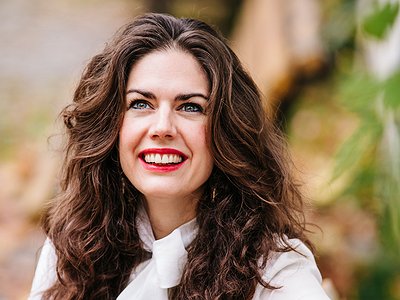Part 2
Could you take us through a day in your life, from a possible morning routine through to your work? Do you have a fixed schedule? How do music and other aspects of your life feed back into each other - do you separate them or instead try to make them blend seamlessly?
Each day is different and I work very randomly. The one routine I have is to get up early, around 7.30, and go into the garden to have a look at the plants, watering them if it hasn't rained much and checking out what has grown. That is a very special moment of my day. I usually take time to have breakfast and then delve into what comes to mind. Usually I start with learning some Arabic and doing some administrative-type work, if necessary. This is usually followed by some musical work, such as playing some classical piano, starting or continuing a composition, arranging a piece of music, preparing for a concert, or listening to a recording and possibly doing some editing or revising, making band-related decisions and sharing thoughts with my bandmates. These different activities can happen during the day or at night. In the afternoon I often give a few piano lessons. I do have at least three meals a day and love to eat well!
Could you describe your creative process on the basis of a piece or album that's particularly dear to you, please? Where did the ideas come from, how were they transformed in your mind, what did you start with and how do you refine these beginnings into the finished work of art?
The piece Descending Tide started with the idea to create a song for my solo project based on a poem of mine. I wanted to use the musical phrases originally composed for a theatre production and to create a texture looping these phrases while improvising and developing an introduction, which would become an accompaniment to the lyrics. Then came an improvised melody using the text of the poem to form a melodic line. I decided to incorporate a clear harmonic development with a V7 chord, and at the end of the lyrics I wanted to use the looper in order to create a IV diminished chord full of sound and texture. The idea was very simple and involves improvisation on top of this huge mass of looped notes. The song ends with a return to the I-7 chord with intermittent transitions back to the V7.
When I recorded this piece, I decided to add a poem in French to the beginning and some wind texture as I felt like it would be the perfect addition. The wind would also end the piece as to close it off. I felt the French text had a direct link to the English lyrics of the piece. The atmosphere created by the haunting wind with whispered lyrics would stop time and bring the listener into a different world, a world where language is a feeling and not necessarily important to understand.
There are many descriptions of the ideal state of mind for being creative. What is it like for you? What supports this ideal state of mind and what are distractions? Are there strategies to enter into this state more easily?
Boredom is the perfect state for being creative. I find that the whole online world is creating a barrier from creativity so it's important to take time away from the internet regularly. I really enjoy going on a composing retreat in a place where I do only that as daily life blocks the empty space needed to compose. I do spend a lot of time at home and luckily I can focus there as well when I decide to work on a project.
When I am not inspired and have to write a composition, I start by practising some classical piano. That puts me in a different mood, out of time, out of space and then I can start working on my own music. Free time is precious and unfortunately many artists have less and less of it as earning money takes time away from it. When J. S. Bach was summoned to compose at the King's Palace, he was only doing that. Patronage was useful for a reason ...
How is playing live and writing music in the studio connected? What do you achieve and draw from each experience personally? How do you see the relationship between improvisation and composition in this regard?
Composing is a slow process that is very enjoyable as I can choose exactly what I want my music to sound like. It's different than a live performance where I am often walking on a thin thread and have to make sure not to tip over. I also really love that aspect as it makes me very focused and challenged. This aspect pushes me to go further than my boundaries. While performing a song with pre-recorded material I need to be focused on the specific structure of the piece and elements which need to emerge at specific moments, such as improvising textures and concentrating on the musicality and lyricism of the performance. This combines into a real balancing act full of adrenaline, which I don't get while composing in my studio. I do however have to prepare for performance within the composition process in order to be able to deliver the music on stage.
How do you see the relationship between the 'sound' aspects of music and the 'composition' aspects? How do you work with sound and timbre to meet certain production ideas and in which way can certain sounds already take on compositional qualities?
For me 'sound' is the production of 'timbre' when I work on a new piece for my solo project. I don't transform the sound with technology, I create it through my voice and record those sounds as parts of a composition. 'Sound' and 'composition' are totally intertwined in that case as I switch from recording a written part to improvising a new part which will become the composition. It all depends on what I am doing in the moment. I sometimes write voicings or melodic lines, which I then record one by one, or I improvise something, which will become a sonic tapestry. It's all connected.
Our sense of hearing shares intriguing connections to other senses. From your experience, what are some of the most inspiring overlaps between different senses - and what do they tell us about the way our senses work? What happens to sound at its outermost borders?
This has intrigued me for such a long time and I am still searching for what makes perception of sound create a specific emotional state through the change of our senses, for example our sense of time or space. I enjoy playing with that but also with the sense of inner balance or state. It has been proven that certain music calms birds and I have been checking out how pitch affects the sense of balance within the human body. When pitches align perfectly, they give a sense of security and peace. It's a really fascinating topic. Also tension and release have a big effect on the body, which is something I love to incorporate in my compositions.
Art can be a purpose in its own right, but it can also directly feed back into everyday life, take on a social and political role and lead to more engagement. Can you describe your approach to art and being an artist?
I value the message that can be sent through music. With my solo project I focus more on the soothing and enchanting effect of music but I also work with other more politically engaged projects, for example the theatre productions of Elzbieta Bednarska. In 2017 and 2018 Bednarska staged accounts of the Chernobyl disaster in Berlin. I was able to compose some of the music for this piece which touched the public very deeply and contributed to the political cause against nuclear power. We received a lot of very touching feedback explaining that such a piece enhanced the realisation of the problems associated with nuclear power plants, which the simple transmission of information (statistics, press articles, etc.) does not allow.
I also plan to write music on a poem in Arabic that expresses the desire to end wars. The poet, Mohammad Mallak is very involved on a political level, and I have already set some of his other works to music.
It is remarkable, in a way that we have arrived in the 21st century with the basic concept of music still intact. Do you have a vision of music, an idea of what music could be beyond its current form?
The implementation of sound has continued to evolve and there is no reason why it should not continue but it is impossible to know what form music will take. The sound combinations are endless so we will never have explored everything. We can divide the sound in wavelength, rhythm and timbre. All of these fields are so expansive it is literally impossible to conclude the exploration of the various elements of sound. I'm very curious to see where this is leading to. Now, as always, it is impossible to predict the future evolution of music. Mozart wouldn't have imagined the emergence of techno music.






